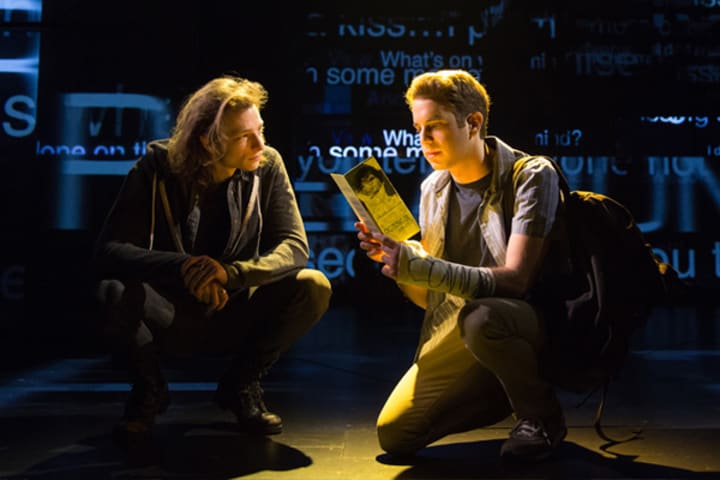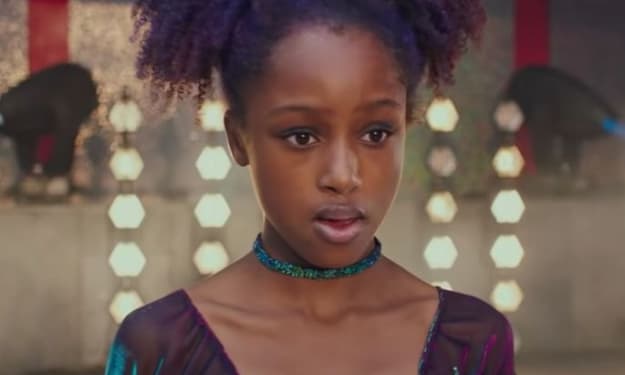5 Things That Aren’t True About "Dear Evan Hansen"
A review based on the score and script.

This article is an edited version of an article previously posted on my old, now deleted account. If you’ve already been here - very little is new.
So, let’s talk about “Dear Evan Hansen”.
(As this is a review, there will be spoilers.)
For those of you who don’t know, "Dear Evan Hansen" is a hit Broadway show about an anxious high-schooler called Evan who, through a misunderstanding, ends up pretending to have been best friends with a recently deceased schoolmate he barely knew. That schoolmate is a boy named Connor Murphy who has recently killed himself. Miraculously, the tangled web of lies that Evan crafts ends up helping Connor’s family to heal and allows him to face his own issues.
Since I can’t see this on Broadway, nor is there an official recording that I’m aware of, I had to content myself with just getting my hands on the music and the script. I do recommend getting both of these, they're available on Amazon.
All opinions you’ll read here concern the songs and the story, rather than anyone’s acting, so listening to the score and reading the play gave me all the information I needed, although it would be nice to see the show live someday.
While trying to figure out what “Dear Evan Hansen” was all about, I read some reviews and, boy, do people have extreme opinions about this thing. So this will not only be a review of the story and music but also a commentary on what some people have said about the show.
#1 "This is the most amazing and revolutionary show ever and everyone should watch it!"
Well… No. While “Dear Evan Hansen” isn’t bad, it also didn’t exactly blow me away as a story. It has some heart, a nice massage, a little bit of humour and a few hummable songs but overall nothing too original and no real moments of brilliance. The way I would describe it is just… a little half-baked? There are the seeds of something there but it just somehow never quite blooms. It left me with the feeling that it was somehow missing a whole act.
The music is good but—despite the popularity of the show’s anthem "You Will Be Found”—isn’t the masterpiece some make it out to be and doesn’t have enough variety in sound and tone. I could have also used a few more songs that don't feature Evan because you do get just a little tired of listening to him all the time.
Many of the characters are underdeveloped, especially Connor who, despite the fact that he dies at the beginning, is an important figure. We are shown some small interactions before his death and we learn little bits from his mother but overall we see more of the fake idea of him that Evan builds than the real person. One could argue that this was the point, and I suppose it works for the majority of the show but by the end I feel like we should have had a slightly better understanding of who he really was.
In relation to both Connor and Evan, mental illness is touched upon but the topic isn’t really explored beyond the cookie-cutter message of “high school sucks but you must have hope.” While I by no means think that every story that mentions depression or anxiety should go into detail about it, nor do I personally think there’s anything offensive about the way it’s portrayed here, I think the show would have benefited from diving just a little bit deeper in order to make us understand the characters.

#2 "This show is a great portrayal of mental illness," or "This show is totally offensive to people with mental illness."
Neither.
There are certain topics—mental illness among them—on which, chances are, as soon as you open your mouth there will be controversy. But does “Dear Evan Hansen” really deserve either hate or praise in this department?
The show is not really too much of a "portrayal" of mental illness because, as I mentioned above, it doesn’t go deep enough to actually "portray" it fully. Things are stated, not shown or explained. This skimming of the surface is not in itself a crime but it can lead to some problems. We don’t know exactly what issues Connor and Evan have, we can only speculate and assume, so it is unfair to try to judge how those issues are handled. In the end, I don’t think the creators necessarily wanted the boys’ conditions to be the focal point. Mental illness isn't just one thing that can be easily defined or packaged into a couple of universally relatable characters. Instead, the show is about how difficult it can sometimes be to find a way to communicate with people—regardless of whether you are completely healthy or have a condition. One of the things I have heard criticised is the very first song of the show (“Anybody Have a Map?”) where the mothers of both Evan and Connor sing about how they are struggling to find ways to reach their children. One reviewer pointed out how awful it was to have these "neurotypical" women (putting that in quotation marks because, well, we have no clue if they are actually neurotypical or not) complaining about how difficult it is to have a child with a mental illness. Well… isn’t it? And why is it heresy to say so? It's also difficult to have a child with cancer, are we not allowed to say that either? It’s difficult even just having a healthy teenager. For me, this is one of my favourite songs. It is not the whining of healthy people who are bashing on sick kids, it’s simply the tragedy of two mothers who want to help and don’t know how—and maybe there isn’t really much they can do. Why is it not okay to have sympathy for them? Understanding their struggle does not in any way undermine that of Evan and Connor themselves. This is not a "who is more miserable" competition!

On the negative side of things, there are several instances where things probably should have been handled with a little more care. Part of the problem is that, again, we don’t know almost anything about the nature of these boys' problems. In Evan's case - is his brain chemistry off since birth? Or is his anxiety mostly due to the trauma of his father leaving? Is it a long-term thing that makes him dependent on medication or is it something that he is capable of overcoming with a change of environment and learning some behavioural techniques? All of these are possible and all of them are legitimate but, because we don’t know, we’re not sure how to react to certain scenes in the show. At one point we learn that Evan has stopped taking his medication and his mother urges him to resume. Now, this is a very tricky scene to write into your story, especially when you haven’t explained what we are dealing with. The stigma around taking medicine for mental issues is a pretty serious thing and the matter is quite complex. There should never be any guilt associated with taking your pills if you need them and no pressure to pretend that you don’t need them. Of course, there are conditions that do not necessarily require you to take medication forever. Is that the case with Evan? Was his anxiety, in fact, a passing thing which he has now worked through and he has stopped taking pills because he genuinely doesn’t need them anymore or are we supposed to think that doctors are evil and useless for prescribing them and parents for making their kids take them in the first place? Was it, as Evan himself suggests, really a case of his mother trying to find a shortcut towards "fixing" her son while being unable to fix the environment which is causing his problems? Again, all of these are possibilities but, without details, just throwing that conversation in there can be dangerous. If you do need pills to balance your brain, getting a girlfriend and suddenly being popular won’t negate that need.

#3 "This is a show about the amazing positive impact that social media can have."
So, Evan makes a speech about Connor—or rather about being an outcast in general—in front of his school and it goes viral.
My reaction is: Eh.
Inspirational speeches, memes, quotes, and videos on the internet are a dime a dozen. I find it very difficult to believe that specific viral videos have a lasting impact very often. Maybe I’m too cynical but my trust in the collective consciousness of online communities isn’t very strong. What I imagine happened with everyone who liked and shared that speech was that they forgot about it five minutes later. The show is almost trying to convince me that Evan’s actions somehow had a more global effect when I really don’t think they did. The importance of the events in the show lies in how they affect a very small group of people, including Evan himself. The attempt to present what’s happening as much bigger kind of falls flat for me. What I do sympathise with is Evan’s effort to overcome his mental block and speak to people (however incredibly cliché that scene at the school assembly is, with him fumbling the beginning but then throwing his cue cards out the window and confidently winging it). I relate to the confidence he gains from all the positive attention. I’m just a bit worried that this confidence may be as fragile as its source, if where it comes from is a viral video.
#4 “This show is a tasteless exercise in forgiving white male mediocrity,” and “This show is so homophobic.”
The first is quoted from the title of a review I read while the second is mentioned in a great multitude of reviews. Now, while I don’t think the show is great, I find such opinions unnecessarily harsh and a bit overloaded with political agenda.
First of all, do we have to shoehorn matters of race and gender where they don’t belong? What in the world does the fact that Evan is white have to do with anything? Absolutely nothing in his story is in any way connected to his race—or the fact that he’s a boy, for that matter. Had he been an Asian girl I don’t see how the story would have changed at all. What about his "mediocrity" makes it specifically "white male mediocrity"? Because girls or people from other races are never outcasts at school, never suffer from anxiety, never have crushes, never lie when put on the spot? Or is it just that white male protagonists are taboo in principle?
Speaking of race, another criticism is the lack of diversity in the show. Granted, that doesn’t really matter when you’re reading the script but on stage it apparently only has one black cast member and some of the complaints have to do with the fact that she is portrayed as an annoying overachiever. Again, I don’t see how that has anything to do with anything in a show where every single character is shown to be extremely flawed. The cast is very small and the vast majority of it consists of the families. Sure, it would be nice if Evan was Asian, Connor was black and one of his parents was Native American but it wouldn’t affect the story in any way. So this is more of a criticism towards the specific casting and would be easy enough to change.

Then there’s the topic of homophobia. The most problematic song when this issue is concerned is "Sincerely, Me." In summary: Evan’s sort-of-friend who is in on the whole deception goes out of his way to tease Evan about him and Connor having a gay relationship. Which, you know, is exactly what many high school boys would do in this situation. Nobody's saying it isn't douchey but it isn't evil and even if it is—the character who makes these comments is not exactly presented in a positive light for doing so.
Evan who is strongly implied to be straight and has a crush on Connor’s sister also goes out of his way to deny being gay and is clearly annoyed by the jokes but should this really be classified as raging homophobia? Okay, yes, it contains two boys (including an imaginary Connor) vehemently denying being gay in song but I feel like it’s a very large jump from that to the show being hateful towards gay people. I find the song to be more a commentary on how insecure teens are than a dig at homosexuality, especially since Evan’s vehement denial is presented as something silly we are meant to laugh at. On top of that, I don’t know, wouldn’t a boy who is openly gay also be annoyed if someone insistently suggested he had a relationship with a girl? I completely agree that a reaction of "but this is not who I am!" can often be quite childish when the thing somebody is calling you is not an insult, but it’s also just human. It’s probably why I got upset when I was very little and sometimes got mistaken for a boy because of my short haircut. I didn’t think there was anything wrong with boys—I love boys—I just wasn’t one and it bothered me that someone would say I was. Today I probably wouldn’t care at all if it happened—as I shouldn’t—but today I am a lot more secure and confident in myself. Evan isn’t, and that is made very clear. So how would you have Evan react—staying in character—when presented with this very common, very believable situation?

#5 "Evan is a hero by the end," and "Evan is a horrible person."
No, he isn’t either one of those.
Evan is an unhappy and socially awkward teenager who, at the start of the show, is so inadequate at navigating life and so incapable of getting out of the hole he’s in that he ends up making some pretty bad choices which luckily don’t lead to a massive disaster. He is someone we are meant to sympathise with because he is going through a relatable struggle, not because he has done something great for other people. Any positive consequences of his actions are entirely accidental.
At the same time, I worry about the sense of empathy of anyone who paints him as a villain. The first time he fails to deny his connection to Connor is a result of his overpowering social anxiety and inability to think rationally under pressure. The show makes it very clear that there is no malicious intent in his lies—on the contrary, they are initially the result of feeling sympathy for the Murphys. When the deception begins Evan has no reason at all to suspect he will gain anything from it. He even wants to come clean early on but is told not to by another character who convinces him that telling the truth would really hurt Connor’s parents. Making things up is certainly a very stupid thing to do and could have ended much worse for everyone but I don’t think anyone should be condemned as a horrible person without taking into account motivation and circumstances. Yes, later on he does get benefits from the whole thing but even then his actions seem guided more by his weakness and his desperate desire to be heard and appreciated than by some premeditated evil plan to get attention.

Then there is the subject of repercussions. Many people seem outraged that Evan isn’t punished for his elaborate lie and Connor’s family ends up forgiving him. I think of myself as someone with a very strong sense of justice and I tend to get quite angry when a bad deed isn’t properly addressed but on this occasion I don’t feel unsatisfied with the ending to the show. While I certainly wouldn’t have blamed the Murphys if they had never spoken to Evan again, that is more out of respect for their personal feelings than any conviction that he needs to be severely punished. Throughout the show Evan understands his mistakes and his weaknesses and ends up owning up to them. It is someone else’s decision to not expose them to the whole world, and that is simply the sensible thing to do in this case, for the benefit of all characters. I have issues with people who don’t comprehend the fact that they are wrong or don’t seem to care about that fact but I don’t have any desire to punish a boy who is already miserable, struggling, and knows he’s wrong.
The point of “Dear Evan Hansen”, as I see it, is to show how difficult communication can be for teenagers and their families and how if there is somehow a breakthrough in communication—even achieved accidentally by questionable means—this can have a profound positive effect. As I already mentioned, the show portrays every single person on stage as flawed and ultimately their tragedy is that they simply cannot connect with each other. A lie—which is in itself a bad thing—becomes the catalyst for bonds to be formed and an excuse for people to reach out to one another. The show doesn’t condone bad behaviour—it acknowledges it and makes the perpetrator acknowledge it as well but it then forgives it because there are sometimes more important things.

Perhaps the most significant point to make is that Evan's lies about who Connor was are not necessarily complete fabrications. They draw upon not only Evan's own experiences but also little tidbits of information he learns from Connor's family like the fact that they used to go for picnics in a now-abandoned orchard when they were all apparently much happier. In a way, he is telling them things they already know but which wouldn't have otherwise come to the surface. Even the very short interaction Evan and Connor have at the start of the show, when Connor randomly decides to sign the cast on Evan's broken arm which no one else has signed, speaks to the possibility that Connor is in fact looking for some connection with Evan whom he recognises as a fellow outcast. The show is suggesting that the friendship Evan invents would not have necessarily been impossible in real life.
In the end, all Evan does is paint the picture of a boy who had affection for his family and wanted to bond with them but couldn't, who didn't have friends but wanted to make some and who felt neglected by everyone and incapable of communicating but deep down just longed to be a normal teenager. I think this picture is more likely to be truthful than not. That's probably part of the reason the Murphys forgive Evan—because there is a good chance that, in the end, he did really give Connor a voice to say the things he couldn't say in life.
About the Creator
Yana Aleks
Fiction writer, reviewer and an incurable chatterbox.






Comments
There are no comments for this story
Be the first to respond and start the conversation.